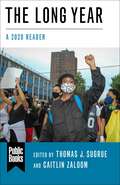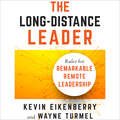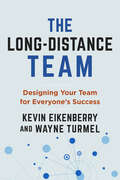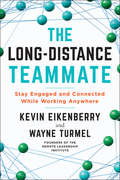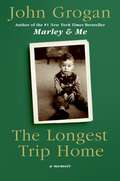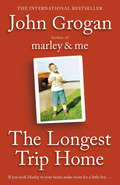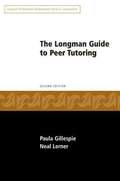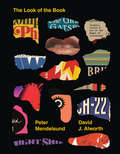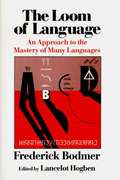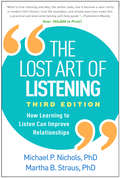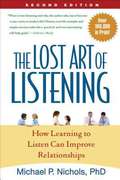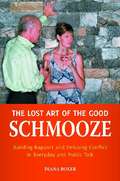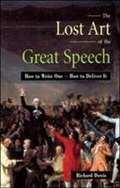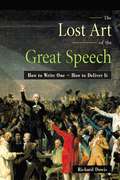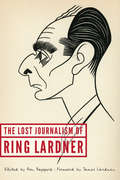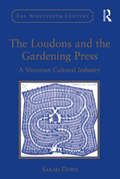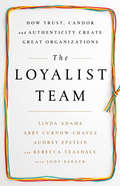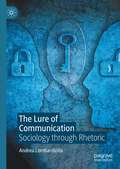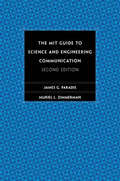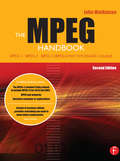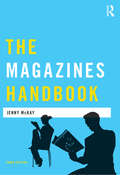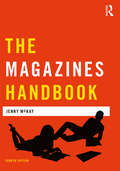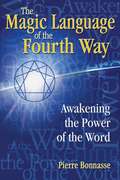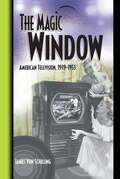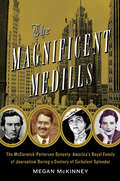- Table View
- List View
The Long Year: A 2020 Reader (Public Books Series)
by Eric Klinenberg Joan Wallach Scott Julie Livingston Natalia Molina Jun Li Guobin Yang Andrew Lakoff Priscilla Wald Warwick Anderson Warren Breckman Adam Tooze Ananya Roy Sophie Lewis Neha Vora Margaret O'Mara Yarimar Bonilla Merlin Chowkwanyun Keeanga-Yamahtta Taylor Margaret Morganroth Gullette Marcia Chatelain Jacob A.C. Remes Joanne Randa Nucho Xiaowei Wang Miguel Centeno Jean-Paul Gagnon Keisha N. Blain Sulfikar Amir Mustafa Dikeç David Schmidt Gautam Bhan David S. Barnes Isabelle Guérin Andy Horowitz Simon Balto Éric Charmes Max Rousseau Michelle Cera Gilles Guiheux Ye Guo Renyou Hou Manon Laurent Anne-Valérie Ruinet Govindan Venkatasubramanian Mathieu Ferry Marine Al Dahdah Sherihan Radi Jeffrey Aaron Snyder Rachel Nolan Evan Lieberman Julia Foulkes Soledad Álvarez Velasco Sophie Gonick Alfonso Fierro Erick Corrêa Gianpaolo Biaocchi Jake Carlson Quentin Ravelli Rikki J. Dean Afsoun Afsahi Emily Beausoleil Selen A. Ercan Cordula Dittmer Daniel F. Lorenz Kathryn Cai Kavita SivaramakrishnanSome years—1789, 1929, 1989—change the world suddenly. Or do they? In 2020, a pandemic converged with an economic collapse, inequalities exploded, and institutions weakened. Yet these crises sprang not from new risks but from known dangers. The world—like many patients—met 2020 with a host of preexisting conditions, which together tilted the odds toward disaster. Perhaps 2020 wasn’t the year the world changed; perhaps it was simply the moment the world finally understood its deadly diagnosis.In The Long Year, some of the world’s most incisive thinkers excavate 2020’s buried crises, revealing how they must be confronted in order to achieve a more equal future. Keeanga-Yamahtta Taylor calls for the defunding of police and the refunding of communities; Keisha Blain demonstrates why the battle against racism must be global; and Adam Tooze reveals that COVID-19 hit hardest where inequality was already greatest and welfare states weakest. Yarimar Bonilla, Xiaowei Wang, Simon Balto, Marcia Chatelain, Gautam Bhan, Ananya Roy, and others offer insights from the factory farms of China to the elite resorts of France, the meatpacking plants of the Midwest to the overcrowded hospitals of India.The definitive guide to these ongoing catastrophes, The Long Year shows that only by exposing the roots and ramifications of 2020 can another such breakdown be prevented. It is made possible through institutional partnerships with Public Books and the Social Science Research Council.
The Long-Distance Leader: Rules for Remarkable Remote Leadership
by Kevin Eikenberry Wayne TurmelLeadership first, location secondAs more organizations adopt a remote workforce, the challenges of leading at a distance become more urgent than ever. The cofounders of the Remote Leadership Institute, Kevin Eikenberry and Wayne Turmel, show leaders how to guide their teams by recalling the foundational principles of leadership. The authors' &“Three-O&” Model refocuses leaders to think about outcomes, others, and ourselves—elements of leadership that remain unchanged, whether employees are down the hall or halfway around the world. By pairing it with the Remote Leadership Model, which emphasizes using technology as a tool and not a distraction, leaders are now able to navigate the terrain of managing teams wherever they are. Filled with exercises that ensure projects stay on track, keep productivity and morale high, and build lasting relationships, this bookis the go-to guide for leading, no matter where people work.
The Long-Distance Team: Designing Your Team for Everyone's Success (The Long-Distance Worklife Series)
by Kevin Eikenberry Wayne TurmelDesign and cultivate remote work teams that actually work.From the experts who brought you The Long-Distance Leader and The Long-Distance Teammate comes the proven and practical guide for leaders to consciously design teams, define and create their desired culture, and encourage and nurture employee engagement-all from a distance. Team design and culture are often presented as separate concepts when they are in fact intertwined in the remote work setting. Using the 3C model of communication, collaboration, and cohesion, leaders will be given the tools to overcome challenges, such as proximity bias and deteriorating social connections, to create an environment where everyone can contribute and add value equally, regardless of location. The 3Cs are Communication-While communication is a fundamental part of being human, it is also a critical foundation of successful work. Without it, teams break down. Collaboration-Remote leaders face the misguided belief that physical presence is required to have a collaborative team. The truth is that proximity has nothing to do with successful collaboration. Cohesion-This dimension includes decidedly nonstructural aspects, such as relationships, trust, and accountability. While difficult to measure, a team's cohesion is critical to its success. Using this framework, leaders of all levels will learn to assess, design, and develop their communication channels, methods for remote collaboration, and ability to foster cohesion to build successful long-distance teams. While a hybrid culture will be different, it can, when done right, be better than what existed before.
The Long-Distance Teammate: Stay Engaged and Connected While Working Anywhere (The Long-Distance Worklife Series)
by Kevin Eikenberry Wayne TurmelWhat does it mean to "go to work" when you don't actually leave the house? This is the ultimate guide for remote workers who want to stay engaged as team members, maintain robust work relationships, and keep an eye on their long-term career goals. Even before the coronavirus hit, remote work was growing at nearly 30 percent per year, and now it's just a fact of life. There are many millions of people who once worked at a central location every day who now find themselves facing an entirely new way of working. Written by the founders of the Remote Leadership Institute, this book is the most authoritative single resource for helping remote workers get work done effectively, build relationships that are both productive and satisfying, and maintain a career trajectory when they are not in constant close contact with their leader, coworkers, or the organization in general.The Long-Distance Teammate tackles three important issues: navigating the personal and interpersonal, growing the skills to be productive, and communicating effectively—all from a distance. In short, there is a big difference between working at home and being an effective member of a team. This practical guide describes that difference and allows you to be a great remote teammate.
The Longest Trip Home: A Memoir
by John GroganAutobiography of the author of "Marley and Me", about his Catholic upbringing outside Detroit in the 60s and 70s, a book about mortality and grace, spirit and faith, and the powerful love of family.
The Longest Trip Home: A Memoir
by John GroganFollowing the phenomenal success of MARLEY & ME, John Grogan’s memoir is a warm and moving tribute to the power of family and love which will delight John’s fans and has all the ingredients to become the same word-of-mouth bestseller.
The Longman Guide to Peer Tutoring
by Paula Gillespie Neal LernerGrounded in current writing center theory and practice, The Guide to Peer Tutoring provides students with a comprehensive introduction to effective tutoring. Throughout the book, readers hear the voices of tutors and writers in first-person peer tutor accounts, reflective essays, and transcripts from actual sessions. Within each chapter, techniques, models, and exercises provide instruction appropriate for any level of tutoring.
The Look of the Book: Jackets, Covers, and Art at the Edges of Literature
by Peter Mendelsund David J. AlworthWhy do some book covers instantly grab your attention, while others never get a second glance? Fusing word and image, as well as design thinking and literary criticism, this captivating investigation goes behind the scenes of the cover design process to answer this question and more.As the outward face of the text, the book cover makes an all-important first impression. The Look of the Book examines art at the edges of literature through notable covers and the stories behind them, galleries of the many different jackets of bestselling books, an overview of book cover trends throughout history, and insights from dozens of literary and design luminaries. Co-authored by celebrated designer and creative director Peter Mendelsund and scholar David Alworth, this fascinating collaboration, featuring hundreds of covers, challenges our notions of what a book cover can and should be.
The Loom Of Language
by Lancelot Hogben Frederick BodmerHere is an informative introduction to language: its origins in the past, its growth through history, and its present use for communication between peoples. It is at the same time a history of language, a guide to foreign tongues, and a method for learning them. It shows, through basic vocabularies, family resemblances of languages―Teutonic, Romance, Greek―helpful tricks of translation, key combinations of roots and phonetic patterns. It presents by common-sense methods the most helpful approach to the mastery of many languages; it condenses vocabulary to a minimum of essential words; it simplifies grammar in an entirely new way; and it teaches a languages as it is actually used in everyday life. But this book is more than a guide to foreign languages; it goes deep into the roots of all knowledge as it explores the history of speech. It lights up the dim pathways of prehistory and unfolds the story of the slow growth of human expression from the most primitive signs and sounds to the elaborate variations of the highest cultures. Without language no knowledge would be possible; here we see how language is at once the source and the reservoir of all we know.
The Lost Art of Listening, Third Edition: How Learning to Listen Can Improve Relationships (Guilford Family Therapy Ser.)
by Michael P. Nichols Martha B. Straus"That isn't what I meant!" Truly listening and being heard is far from simple, even between people who care about each other. This perennial bestseller--now revised and updated for the digital age--analyzes how any conversation can go off the rails and provides essential skills for building mutual understanding. Thoughtful, witty, and empathic, the book is filled with vivid stories of couples, coworkers, friends, and family working through tough emotions and navigating differences of all kinds. Learn ways you can: *Hear what people mean, not just what they say. *Share a difference of opinion without sounding dismissive. *Encourage uncommunicative people to open up. *Make sure both sides get heard in heated discussions. *Get through to someone who never seems to listen. *Ask for support without getting unwanted advice. *Reduce miscommunication in texts and online. From renowned therapist Michael P. Nichols and new coauthor Martha B. Straus, the third edition reflects the huge impact of technology and social media on relationships, and gives advice for talking to loved ones across social and political divides
The Lost Art of Listening: How Learning to Listen Can Improve Relationships (2nd edition)
by Michael P. NicholsNichols (psychology, College of William and Mary) provides a thoughtful guide to the art of listening, addressing the reasons why we so often fail to listen attentively to others, as well as providing strategies for getting oneself heard. Clear examples demonstrate techniques for better communication in both personal and professional relationships. Lacks an index and a bibliography. Annotation c. by Book News, Inc. , Portland, Or.
The Lost Art of the Good Schmooze: Building Rapport and Defusing Conflict in Everyday and Public Talk
by Diana Boxer<p>The good schmooze is talk about life itself: the good, the bad, and the ugly--a heartfelt interaction with others--chatting, not "chatting up." The Lost Art of the Good Schmooze: Building Rapport and Defusing Conflict in Everyday and Public Talk is about what to say, when to say it, and how to say it. Full of insights that will prove useful at work, at home, with friends, and just about everywhere else, the book will help readers become tactful schmoozers who can defuse situational tensions and lubricate personal, social, workplace, and political interactions with others. <p>The book is organized around five occasions: schmoozing in social interactions, family schmoozing, schmoozing in the workplace, schmoozing in education, and schmoozing in cross-cultural interactions. Examples of both successful and failed schmoozing are drawn from television, films, news, and everyday life. Hundreds of real-world verbal interactions illustrate how recapturing this lost art can lead to increased harmony in all spheres of life.</p>
The Lost Art of the Great Speech: How to Write It, How to Deliver It
by Richard DowisThis authoritative speech-writing guide covers every essential element of a great speech, with excerpts from some of history's most memorable speeches.
The Lost Art of the Great Speech: How to Write One--How to Deliver It
by Richard DowisLearn how to give powerful, on-target speeches that capture an audience's attention and drive home a message.Splashy slides, confident body language, and a lot of eye contact are fine and well. However, if a speech is rambling, illogical, or just plain boring, the impact will be lost. The key is not just in the delivery techniques, but in tapping into the power of language.Prepared by award-winning writer and journalist Richard Dowis, The Lost Art of the Great Speech covers every essential element of a great speech, including:outlining and organizing,beginning with a bang,making use of action verbs and vivid nouns,and handling questions from the audience.Plus, this authoritative speech-writing guide includes excerpts from some of history's most memorable speeches--eloquent words to contemplate and emulate. Discover how to not only write a great speech, but also how to deliver it even better.
The Lost Journalism of Ring Lardner
by James Lardner Ron Rapoport Ring LardnerRing Lardner’s influence on American letters is arguably greater than that of any other American writer in the early part of the twentieth century. Lauded by critics and the public for his groundbreaking short stories, Lardner was also the country’s best-known journalist in the 1920s and early 1930s, when his voice was all but inescapable in American newspapers and magazines. Lardner’s trenchant, observant, sly, and cynical writing style, along with a deep understanding of human foibles, made his articles wonderfully readable and his words resonate to this day. Ron Rapoport has gathered the best of Lardner’s journalism from his earliest days at the South Bend Times through his years at the Chicago Tribune and his weekly column for the Bell Syndicate, which appeared in 150 newspapers and reached eight million readers. In these columns Lardner not only covered the great sporting events of the era—from Jack Dempsey’s fights to the World Series and even an America’s Cup—he also wrote about politics, war, and Prohibition, as well as parodies, poems, and penetrating observations on American life.The Lost Journalism of Ring Lardner reintroduces this journalistic giant and his work and shows Lardner to be the rarest of writers: a spot-on chronicler of his time and place who remains contemporary to subsequent generations.
The Loudons and the Gardening Press: A Victorian Cultural Industry (The Nineteenth Century Series)
by Sarah DewisThrough close readings of individual serials and books and archival work on the publication history of the Gardener’s Magazine (1826-44) Sarah Dewis examines the significant contributions John and Jane Webb Loudon made to the gardening press and democratic discourse. Vilified during their lifetimes by some sections of the press, the Loudons were key players in the democratization of print media and the development of the printed image. Both offered women readers a cultural alternative to the predominantly literary and classical culture of the educated English elite. In addition, they were innovatory in emphasizing the value of scientific knowledge and the acquisition of taste as a means of eroding class difference. As well as the Gardener’s Magazine, Dewis focuses on the lavish eight-volume Arboretum et Fruticetum Britannicum (1838), an encyclopaedia of trees and shrubs, and On the Laying Out, Planting, and Managing of Cemeteries (1843), arguing that John Loudon was a radical activist who reconfigured gardens in the public sphere as a landscape of enlightenment and as a means of social cohesion. Her book is important in placing the Loudons’ publications in the context of the history of the book, media history, garden history, urban social history, history of education, nineteenth-century radicalism and women’s journalism.
The Loyalist Team: How Trust, Candor, And Authenticity Create Great Organizations
by Linda Adams Jody Berger Abby Curnow-Chavez Audrey Epstein Rebecca TeasdaleGreat teams are built and maintained with great intention, though they can make it look deceptively easy. Too many teams engage in dysfunctional behaviors or fall into territorialism, apathy, and unproductive relationships. The result? An overwhelmed, unengaged, and stressed-out workforce that settles for average or poor performance.Here, four authors with a combined century of management experience show readers how every team can be extraordinary. The authors introduce their field-tested Loyalist Team 3D assessment that allows anyone to get to the heart of why teams break down, identify the weaknesses in their own team, and build a Loyalist Team. This kind of team has members who ensure each other's success as they work to ensure their own, operate with absolute candor, and value loyalty and authenticity to deliver results, create a healthy work environment, and help companies succeed. The Loyalist Team is a must-read for anyone who wants their team to achieve extraordinary results.
The Lure of Communication: Sociology through Rhetoric
by Andrea LombardiniloThis book addresses the convergence of sociology, communication and rhetoric, with particular reference to the contemporary expressive and social patterns of mass communication. Using rhetoric as a meta-conceptual apparatus for the sociology of communication, this book offers an original and comprehensive critique of historical social theory alongside 20th century communication researchers. The author demonstrates the symbiotic relationship between the rhetorical structures of the media-sphere and the new narrative formats in which cultural representation merges into social and civil observation. This book will be of interest to academics and students studying sociology, communication and cultural studies.
The MIT Guide to Science and Engineering Communication, second edition
by James Paradis Muriel ZimmermanA second edition of a popular guide to scientific and technical communication, updated to reflect recent changes in computer technology.This guide covers the basics of scientific and engineering communication, including defining an audience, working with collaborators, searching the literature, organizing and drafting documents, developing graphics, and documenting sources. The documents covered include memos, letters, proposals, progress reports, other types of reports, journal articles, oral presentations, instructions, and CVs and resumes. Throughout, the authors provide realistic examples from actual documents and situations. The materials, drawn from the authors' experience teaching scientific and technical communication, bridge the gap between the university novice and the seasoned professional. In the five years since the first edition was published, communication practices have been transformed by computer technology. Today, most correspondence is transmitted electronically, proposals are submitted online, reports are distributed to clients through intranets, journal articles are written for electronic transmission, and conference presentations are posted on the Web. Every chapter of the book reflects these changes. The second edition also includes a compact Handbook of Style and Usage that provides guidelines for sentence and paragraph structure, punctuation, and usage and presents many examples of strategies for improved style.
The MPEG Handbook
by John WatkinsonA complete, professional 'bible' on all aspects of audio and video compression using MPEG technology, including the MPEG-4 standard and, in this second edition, H-264. The clarity of explanation and depth of technical detail combine to make this book an essential and definitive reference work.THE MPEG HANDBOOK is both a theoretical and practical treatment of the subject. Fundamental knowledge is provided alongside practical guidance on how to avoid pitfalls and poor quality. The often-neglected issues of reconstructing the signal timebase at the decoder and of synchronizing the signals in a multiplex are treated fully here.Previously titled MPEG-2, the book is frequently revised to cover the latest applications of the technology.
The Magazines Handbook
by Jenny McKayThe Magazines Handbook has firmly established itself as the essential introduction to the theories and practices of the modern magazine industry. This fully updated third edition comprehensively examines the business of publishing magazines today and the work of the contemporary magazine journalist. Jenny McKay draws examples from a broad range of publications to explore key jobs in the industry, covering everyone from the sub editor to the fashion assistant, as well as analysing the many skills involved in magazine journalism, including commissioning, researching, interviewing, and production. Updated specialist chapters discuss the growth and development of electronic publishing and online journalism, new directions in magazine design, photography and picture editing, and the most up to date legal frameworks in which magazine journalists must operate. The Magazines Handbook includes: • Interviews with magazine journalists, editors, and publishers • Advice on starting out and freelancing in the magazine industry • An analysis of ‘new journalism’ and reportage • A glossary of key terms and specialist concepts • Information on contacts, courses and professional training.
The Magazines Handbook (Media Practice)
by Jenny McKayThe Magazines Handbook is an introductory guide to all aspects of magazine journalism and publishing. The book explores the latest innovations in digital design and delivery, whilst also reaffirming the continued importance of key journalistic skills, including good interviewing, feature writing and news writing. The book includes chapters on the visual aspects of magazines, such as illustration and picture editing, and chapters covering the business background of this increasingly global industry. Jenny McKay offers tips on training and work experience as well as outlining the function of various editorial jobs. Profiles of four young journalists give a flavour of life in the early years of a career. Chapters include: advice on embarking on a career in magazine journalism; an overview of magazine design and the production process; analysis of the state of the magazine industry today, with a look to its future; a discussion of legal issues related to magazine journalism; a glossary of key terms and recommended reading in every chapter. Now in its fourth edition, The Magazines Handbook offers a nuanced and reflective account of periodical journalism, ideal for students of journalism and budding professionals who are seeking a useful starting point for wide-ranging academic discussion about magazines.
The Magic Language of the Fourth Way: Awakening the Power of the Word
by Pierre BonnasseAn application of Gurdjieffian principles to fully and properly activate the power of language • Explains the relationship between the Gurdjieff enneagram and sacred geometry and harmonics • Shows that the objective power of language--and art and music--lies in the ability to use symbols that will mean precisely the same thing to anyone • Includes a new English translation of René Daumal’s essay “The Holy War” In The Magic Language of the Fourth Way, Pierre Bonnasse applies the esoteric teachings of Fourth Way mystic G. I. Gurdjieff and the insights of initiate René Daumal to show how to fully and properly activate the power of language. Bonnasse shows how words can regain the strange magical powers they possessed in the first days of humanity, when words created the realities of what they described. This is a far cry from today’s world in which even writers lament the impotent nature of language.Bonnasse uses the relationship between the Gurdjieff enneagram and sacred geometry and harmonics to reveal the power given to words by the notes of the scale. He shows not only how to discover the objective power of words but also how to apply the relationship between language and living to maximum effect. He explains that the objective power of language--and art and music--lies in the ability to use symbols that will mean precisely the same thing to anyone. The Magic Language of the Fourth Way serves as a clear and generous introduction to the complexities of Gurdjieffian thought as well as a descriptive how-to manual for Fourth Way aspirants on the uses of objective language for spiritual advancement.
The Magic Window: American Television ,1939-1953
by Jim Von SchillingFirst published in 2002. Routledge is an imprint of Taylor & Francis, an informa company.
The Magnificent Medills: The McCormick-Patterson Dynasty: America's Royal Family of Journalism During a Century of Turbulent Splendor
by Megan McKinneyThe riveting story of the country’s first media dynasty, the Medills of Chicago, whose power and influence shaped the story of America and American journalism for four generations When thirty-two-year-old former lawyer Joseph Medill bought a controlling stake in the bankrupt Chicago Daily Tribune in 1855, he had no way of foreseeing the unparalleled influence he and his progeny would have on the world of journalism and on American society at large.Medill personally influenced the political tide that transformed America during the midnineteenth century by fostering the Republican Party, engineering the election of Abraham Lincoln and serving as a catalyst for the outbreak of the Civil War. The dynasty he established, filled with colorful characters, went on to take American journalism by storm. His grandson, Colonel Robert R. McCormick, personified Chicago, as well as its great newspaper, the Chicago Tribune, throughout much of the twentieth century. Robert’s cousin, Joseph Medill Patterson, started the New York Daily News, and Joe’s sister, Cissy Patterson, was the innovative editor of the Washington Times-Herald. In the fourth generation, Alicia Patterson founded Long Island’s Newsday, the most stunning journalistic accomplishment of post–World War II America. Printer’s ink raged in the veins of the Medills, the McCormicks and the Pattersons throughout a century, and their legacy prevailed for another five decades—always in the forefront of events, shaping the intellectual and social pulse of America. At the same time, the dark side of the intellectual stardom driving the dynasty was a destructive compulsion that left clan members crippled by their personal demons of chronic depression, alcoholism, drug abuse and even madness and suicide.Rife with authentic conversations and riveting quotes, The Magnificent Medills is the premiere cultural history of America’s first media empire. This dynamic family and their brilliance, eccentricities and ultimate self-destruction are explored in a sweeping narrative that interweaves the family’s personal activities and public achievements against a larger historical background. Authoritative, compelling and thoroughly engaging, The Magnificent Medills brings the pages of history that the Medills wrote vividly to life.
